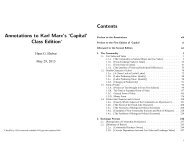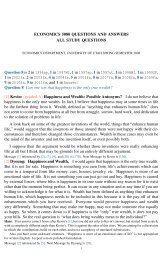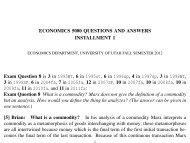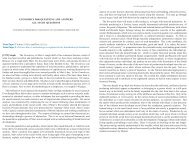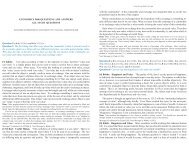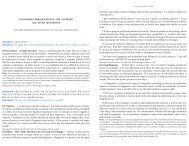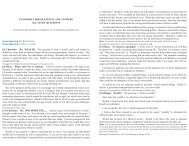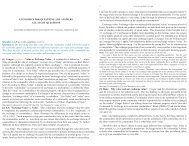Question 1 What did Marx mean with his formu - University of Utah
Question 1 What did Marx mean with his formu - University of Utah
Question 1 What did Marx mean with his formu - University of Utah
Create successful ePaper yourself
Turn your PDF publications into a flip-book with our unique Google optimized e-Paper software.
U <strong>of</strong> <strong>Utah</strong> Econ 5080 2005fa 79<br />
is qualitatively different from that <strong>of</strong> a construction worker. But since many construction workers could become<br />
doctors if they spent enough time to get the education, and since the cost <strong>of</strong> t<strong>his</strong> education can ultimately be reduced<br />
to labor-time as well, it is possible to reduce t<strong>his</strong> qualitative difference into a quantitative difference <strong>of</strong> more labortime.<br />
Your second paragraph is superfluous and confusing: the question is asking about the value created by skilled<br />
labor, not the wage paid for skilled labor.<br />
Finally a brief remark about your first paragraph: value is not a calculation but, in <strong>Marx</strong>’s theory, it is something<br />
real that exists out there. One can try to calculate its magnitude, but t<strong>his</strong> does not make value itself a calculation,<br />
just as the diameter <strong>of</strong> the earth is not a calculation.<br />
Final Grading Note by Hans: All your submissions are substantial works, some <strong>of</strong> them are extremely good, and<br />
your participated consistently. You sometimes have trouble delivering your work in the assigned time slots, and the<br />
work is sometimes uneven. Perhaps t<strong>his</strong> simply <strong>mean</strong>s that you do not have enough time.<br />
First Message by Dandy is [343].<br />
[1643] Parmenio: graded B+ So far there seems to be a consensus that skilled labor, that<br />
<strong>of</strong> an engineer or doctor, is more valuable than unskilled labor, such as a janitor. I would<br />
agree <strong>with</strong> what has been said on the subject so far also, the skilled has spent more <strong>of</strong> <strong>his</strong><br />
time learning a skill than a janitor does learning theirs, and there is a greater need for skilled<br />
labour than there is unskilled labour.<br />
However not all doctors get paid the same too, for instance there are doctors that live in<br />
3rd world countries that don’t charge as much as doctors in developed countries, and the<br />
same <strong>with</strong> engineers. I have read that there are people that charter flights to India to get a<br />
surgery they need from the UK, they would rather pay for the plan ticket and the full cost <strong>of</strong><br />
the surgery in India than wait on the UK’s waitlist for a few years in which they might die.<br />
But the skill set for the needed surgery is the same, not to mention the doctors sometimes<br />
were trained in the same westen schools. However you might not have the same benefits, like<br />
the capacity to sue if something goes wrong in the surgery, or the most advanced facilities<br />
too.<br />
We see the same <strong>with</strong> engineers, companies outsource certain engineering jobs to less<br />
devoloped countries because they are cheaper, however sometimes the work might not be up<br />
to par. SueGirl’s husband works as a s<strong>of</strong>tware engineer who had to fix some program that<br />
was outsourced [1138].<br />
The dichotomy doesn’t have to be to underdeveloped and developed too, there is a vast<br />
discrepancy between the doctor or attorney who lives in LA or NYC-vs-SLC or Boise. The<br />
skill levels are the same, the facilities are the same, but they pay differently because <strong>of</strong> the<br />
relative prices one needs to live in the areas.<br />
Also there is a vast discrepancy for certain specialties <strong>with</strong>ing a givin pr<strong>of</strong>ession. Surgeons<br />
get paid better than pediatricians. However in order to get certified as a surgeon you<br />
have to get more residency training than a pediatrician, so even though the surgeon gets<br />
more, they also had to spend a lot more time getting trained.<br />
Hans: You are discussing how much the workers get paid instead <strong>of</strong> how much value they produce per hour.<br />
According to <strong>Marx</strong>, these are two very different things.<br />
Regarding the question how much they get paid, I don’t think that “there is a greater need for skilled labor”, but<br />
instead I would say: “it is easier to depress the wages <strong>of</strong> unskilled laborers by hiring someone <strong>of</strong>f the street.” Getting<br />
a skill is somewhat an alternative to forming a union: it makes you less vulnerable to the excesses <strong>of</strong> exploitation.<br />
(Although things seem to be changing here <strong>with</strong> outsourcing skilled labor from India.)<br />
Next Message by Parmenio is [1860].<br />
80 2005fa Econ 5080 U <strong>of</strong> <strong>Utah</strong><br />
[1649] Ace: graded A– There seems to be many contradicting answers to t<strong>his</strong> question.<br />
Tesa and Zone both think that the value per hour is the same but both have been mislead<br />
I think. Comparing a teacher to a doctor is like comparing a high school graduate <strong>with</strong> a<br />
student that receives a bachelor’s degree or even a graduate degree. I think that the college<br />
graduates have the upper hand on the value per hour produced. A doctor goes to 4 to 8 years<br />
more schooling to receive a status <strong>of</strong> a practitioner than does a high school P.E. teacher. I<br />
have to agree <strong>with</strong> Bosox and Rudy mostly because they pulled the quote from the annotations<br />
saying that “...a smaller amount <strong>of</strong> complicated labor is equal to a bigger amount <strong>of</strong><br />
simple labor.” I think that t<strong>his</strong> sums it up, that someone <strong>with</strong> more training will receive a<br />
higher wage because they are producing more value per hour. In t<strong>his</strong> case the capitalist can<br />
still pay the higher wage and still have a large surplus value at the end <strong>of</strong> the day. When the<br />
janitor makes a higher wage that will be the day that he produces enough per hour for <strong>his</strong><br />
capitalist to pay him that wage.<br />
Hans: According to <strong>Marx</strong>, all workers, even janitors, produce far more value per hour than they get paid.<br />
Final Grading Note by Hans: You have an excellent understanding <strong>of</strong> the text. But while <strong>Marx</strong> thinks that the<br />
contradictions <strong>of</strong> capitalism are irreconcilable and will eventually either lead to the overturn <strong>of</strong> capitalism or to a<br />
barbaric state <strong>of</strong> existence, you seem to think that the differing interests can be harmonized. I can only wish for all<br />
<strong>of</strong> us that <strong>Marx</strong> is wrong and you are right.<br />
Next Message by Ace is [1746].<br />
[1669] Fidel: In my inculcated capitalist worldview the answer seems obvious; skilled<br />
labor definitely produces more value per hour than unskilled labor. Why else would we pay<br />
Doctors so much money? That surface answer gives way after more consideration. We have<br />
been trained and trained over the years to see value as price or pay. In other words “market<br />
value” but not even the market recognizes t<strong>his</strong>. A good salesmen will <strong>of</strong>ten earn more money<br />
than an electrical engineer. A dock worker more than a pr<strong>of</strong>essor.<br />
<strong>Marx</strong> says that complicated labor “counts” as multiplied simple labor. Hans further clarifies<br />
t<strong>his</strong> by pointing out that “counts” is not the same as “is”. The “counts” is the market at<br />
work.<br />
In the annotations Hans explains that labor has equal value but the market assigns a multiple<br />
to skilled labor versus unskilled labor. Capital is a critique <strong>of</strong> capitalism. Thus it is<br />
also a critique <strong>of</strong> how the market assigns market value which is very much in contrast to<br />
labor value. So what again is value? Value is derived from labor power. Everett remarked in<br />
[2001fa:163-3] that “when linen weaving is done by hand it contains more value than when<br />
it is woven by machine”.<br />
Therefore value is the same whether it is a janitor or engineer doing the labor. It is not<br />
the commodity they produce but the labor power that went into producing it.<br />
Hans: The equality <strong>of</strong> labor is not an ethical principle, but it is built into the structure <strong>of</strong> a market system to treat<br />
all labor as homogeneous <strong>with</strong> only quantitative (instead <strong>of</strong> qualitative) differences. T<strong>his</strong> comes from the simple<br />
fact that the market equates all commodities to money, which is also only capable <strong>of</strong> quantitative, not qualitative,<br />
differences.<br />
Next Message by Fidel is [1956].



